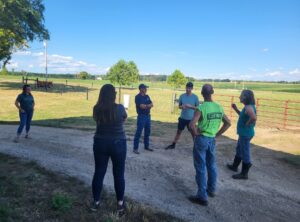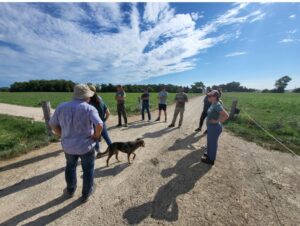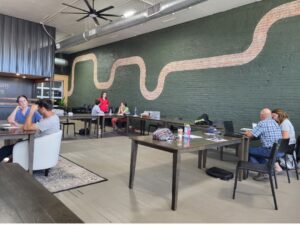Final report for ENC20-195
Project Information
Managed grazing is a sustainable method by which farmers can produce high quality food and many ecosystem services. The overall goal of this project is to better equip a targeted group of educators and farmers associated with Dairy Grazing Apprenticeship (DGA) to train the next generation of dairy farmers, focusing on sustainable farming practices including managed grazing. The overall effectiveness of DGA hinges largely on the knowledge and abilities of these outlying Education Coordinators and Masters.
Outcomes of the project include:
- Improved educational and mentoring skills for Education Coordinators and Master Graziers (a.k.a. Masters), who are critical within DGA and more broadly in training this next generation of grazing dairy farmers.
- Increased knowledge of grazing dairy systems for Education Coordinators and Masters, including the diversity of practices that can lead to a successful operation.
- All of which will lead to improved morale for the industry, increasing number of grazing dairy farms, and improved sustainability (environmental and economic) of the overall dairy industry.
Activities will include:
- An annual Education Coordinator seminar where all DGA Education Coordinators come together at a central location once per year to gain skills related to administering DGA, networking, visiting farms and learning skills relevant to successful dairy grazing.
- An annual Master Grazier Summit, where DGA Masters will gather to learn from experts in the field, network with others that are mentoring Apprentices, further plans with Education Coordinators and DGA staff.
- Virtual learning opportunities for Education Coordinators, Masters and DGA Apprentices.
Partnerships
The network of regional DGA Education Coordinators currently spans the North Central and Northeast U.S. regions. The partnership between these Education Coordinators and DGA staff is critical to the success of the organization and mission. The annual seminars proposed in this project will provide an extremely valuable opportunity for these individuals to gather at a common location to network, share strategies, improve common curriculum, and inspire everyone to conduct excellent work on behalf of DGA.
The partnerships between Education Coordinators and Masters is equally important to the mission of DGA. The opportunities for networking and learning at Master Summits and Virtual Roundtables allows these groups to interface and learn together.
Target Audience
An important product of the proposed activities will be participation in meetings and events. In particular, anticipated attendance at Education Coordinator Seminars and Education Coordinator Virtual Meetings will be approximately 20 total individuals (15 Education Coordinators and 5 DGA Staff). These same 20 individuals (subject to change with position turnover or expansion of program) would have recurring participation in the activities focused on them.
The in-person attendance goal for each of the Master Summits is 30 grazing dairy farmers for each event. Furthermore, we would expect an additional 10 DGA staff and/or Education Coordinators and up to 30 Apprentice candidates at each of these Summits. An additional 30-50 DGA Masters and Apprentices would be expected to participate virtually. Public participation will be encouraged for a portion of the summit, and attendance will likely vary regionally.
The attendance goal for the Virtual Roundtables is 30 live participants for each session. In addition, recordings of each Roundtable will be made available online, which we would expect to have a long-lasting impact with the potential for dozens if not hundreds of views in the three years following the live event. These recorded roundtables are a key educational output from this PDP, as the information will be a very useful and impactful mix between scientific based recommendations and on the ground farmer logistics and observations.
Curriculum
Improvements and additions to existing DGA curriculum and other educational materials will be continuously updated during the course of this project. This includes the DGA Training Manual and other print/online resources available to Education Coordinators, Masters and Apprentices, as well as the online courses offered through the Managed Grazing Innovation Center. The proposed events will provide key opportunities to gather feedback from Education Coordinators and Masters about the educational materials, which can continuously be updated to improve the experience for the mentors and Apprentices.
Cooperators
Education
Please see section below for full explanation of the event/programming related to this project.
Education & Outreach Initiatives
Improve educational and mentoring skills for 11 education coordinators in our 16-state network.
DGA held our final retreat for this grant period: a two and a half-day, in-person Education Coordinator Retreat in Celina, OH. Eight (8) ECs attended in-person from WI, MN, PA, OH, MO, OR, ME and three (3) attended virtually, through Zoom from NY, VT, and NC. Six (6) DGA staff were also in virtual attendance.
The pre-planned two-day Mentor Summit that was to be held prior to the EC Retreat was cancelled due to lack of RSVPs from Mentor farmers for the third year in a row. The high cost of travel and the burden of finding coverage for farms while gone have been cited as the main reasons mentors are unable to gather. Going forward smaller regional events will be planned, and mentor roundtables at pasture walks will be supported and facilitated by ECs.
The first day of the EC Retreat included two (2) farm tours on DGA Mentor farms (photos included). Our first farm was Settlage Family Farm in St Mary's Ohio. The Settlages run a 300+ head herd with plans to expand, and ship to Organic Valley. Jordan and his father are passionate graziers who always keep an eye on efficient and restorative use of their grazing land, and of sustainable milking practices. They practice a 16 hour milking schedule and noted that this is easier on staff burden, that the cows get to spend more time grazing and digesting, and that it works better for their family's work/life balance. Since they have implemented this system they haven't noticed any decreases in milk quality or quantity, and the farm and all of the employees, including their apprentice, appreciate the flexibility this milking schedule allows. They have made extensive renovations to bring water and provide pathways to far away pastures so that the cows can spend as much time as they comfortably can out on pasture. Our second farm was as vastly different operation- Bair-Trax Farm in Troy is one of our newest approved mentors. They keep their herd number around 30 and want to stay that way- they never want to sacrifice quality for quantity. Their premium A2/A2 Organic, soy-free feed raw milk is sold directly to herdshare members that subscribe to their farm. They arrange pickup times for a share of milk and some limited milk products such as butter or participate in a drop ship in select locations closer to Cincinnati. They utilize a nurse herd to feed calves, which was especially interesting to the group. ECs had the opportunity to see and ask questions about two vastly different and incredibly successful milk markets at these farms. Both farms keep excellent records and were able to share notes on labor costs and training which is especially valuable information for ECs to take home and share with their cohorts.


Day two of the event was concentrated on EC education, including discussing how to foster "soft skills" or "relational competencies" such as effective communication and communication styles, conflict resolution, adaptability/flexibility, teamwork, time management, leadership, negotiation, stress management, emotional intelligence, active listening skills and creativity in problem solving. Each EC completed pre-work answering questions about these topics for presentation and discussion. The EC position has historically been quite effective at communicating with mentors/producers and building and sustaining relationships. They are truly the heart of the apprenticeship's success. One of the goals of the workshop was to identify and quantify these skills that go beyond core competencies of recruiting and hosting educational opportunities, because without these relationship skills none of those things could occur. We also want to identify opportunities to bridge any gaps in these skills, and hold space for ECs to learn from each other by fostering a collaborative environment. Learning how ECs employ these skills will also help drive further trainings and onboarding, and DGA will be able to meaningfully share these skills with other organizations such as new agricultural apprenticeships. Other goals of this workshop day were to share ideas on being an effective EC, discuss strategies for common issues that come up with their cohort, and create a useable, adaptable plan to bring home to their regions and implement in their communications with farmers and apprentices. As another prework assignment, ECs were encouraged to directly ask for any needs in terms of funding, program lacks, future opportunities to skill up, work/life balance, and innovative ideas to improve the overall apprenticeship experience so that we can remain effective and relevant as DGA grows. After lunch we participated in breakout groups for EC Core Competencies: Supporting Mentor/Apprentice pairs, Journeyworker Engagement, Facilitating Group Education Opportunities, and Outreach, Recruitment and Retention. ECs seem to learn best from each other in this truly unique position, just as farmers learn best from other farmers. Feedback for this retreat states that ECs find this time incredibly valuable. To feel understood and be validated, to express concerns, to share successes, and to problem-solve together is crucial and invigorates the work that they do. ECs spend a lot of time travelling alone and 1:1 with their mentor and apprentice pairs, so coming together and sharing their experiences feels valuable and reduces feelings of isolation. They continue to express gratitude for this opportunity to be together in one location with peers who truly understand the nature of the work that they do. (evaluation data included: EC Retreat Feedback)
ECs did deep work in break out groups on supporting Mentor/Apprentice pairs by discussing effective communication methods, key elements of effective support which include relationship development and maintenance, conflict resolution, tools and resources mentors need to be successful, and how Apprentice Manager and DGA staff can best support EC needs in the field.

ECs also dug into Journeyworker engagement and resources discussing ongoing advising, bank/FSA prep, cohort involvement, financial assistance classes offered on MGIC, a regular check-in structure, and an improved journeyworker exit survey to determine future needs.
On the topic of Group Education, ECs shared strategies on identifying relevant pasture walk topics, creative incentives for participation, before/after surveys to determine effectiveness, and creating space for mentors to connect at events to facilitate more regional gatherings.
Lastly, ECs discussed Outreach and recruitment strategies including collaborating with other regional and community leaders, cost-sharing and stipends for mentors, utilizing GRAZE magazine to promote apprenticeship and celebrate graduates, and looking in atypical places for candidates, especially as DGA strives to make apprenticeship opportunities available to all.
All EC prework was completed individually, but much of what was shared was mirrored by others in our conversations. Our goals in discussing this prework together were to come away with programming/funding ideas, support and learn from each other, discuss how to best support and provide value to farmers, foster opportunities for brainstorming and connecting, identifying the nitty gritty of operations, building connections with cohorts, creating the space on farms for ECs, mentors and apprentices to connect, and create a framework and a toolbox that we can take back out into the field with us. This style of communicating in particular was a great way for veteran ECs to share their skills with newer ECs and identify opportunities for training. An overall need identified was to find funding to facilitate conversations with cohorts. How can we compensate mentors and apprentices for their time so that they are able to provide feedback without taking away from their busy daily activities. Another overall need identified was to have a deeper understanding of workforce development opportunities at each state's level. There seems to be a disconnect with agricultural apprenticeships and workforce boards and ag apprentices are not getting the same opportunities, compensation, and equipment that other non-ag apprenticeships are. ECs were tasked with improving these relationships at their state level. ECs discussed the idea of shadowing one another for their farm visits. When geographically appropriate ECs could attend farm visits together to learn strategies, communication styles and time management to have efficient, relevant visits on farms. All ECs noted that as part of their relationship building skills they discussed the lives of the people in their cohort, not just the tasks of farming. Our ECs have a deep understanding of the big picture of farming along with the daily grind of dairy. Often they are able to help apprentices zoom out to understand the why behind their daily tasks. ECs expressed a desire to go through our handbook together once a month on our biweekly calls as part of our agenda meeting. This has been added to our agenda meeting. We discussed potential grant funding to support more extensive travel and technology needs. ECs identified places they'd like to skill up such as grass identification, and basic Spanish phrases, and resources for farmers who would like to get more involved with beef grazing. Though DGA is not a beef grazing apprenticeship per se, it would be good to have a relationship with apprenticeships that are as this continues to be an ask of dairy farmers and their journeyworkers. We have reached out to Grassworks to see how we can work together more here. ECs expressed a desire for more case studies available on the DGA website. Often dairy farmers create innovative solutions that could be shared if we captured their stories. We are working closely with GRAZE magazine to create more of these case studies from our successful farmers. ECs expressed a strong desire for coaching and empowerment- how can they have delicate conversations with their cohorts? How can they mediate difficult situations? ECs desire to feel empowered and capable around these intimate topics. Lastly, ECs made suggestions to improve their website dashboards and to keep their cohorts organized. These important conversations will dictate grant funding for 2025 and beyond, including a professional development grant through SARE, and a NERFBC grant to improve technical assistance to the North East region. EC changes for the website have been put into place including a more mobile friendly version, categories for apprentices (paused, inactive, etc) and easier to maneuver scroll bars to manage the internal messaging systems.
Over dinner ECs were excited to discuss what they had learned that day and several made plans to shadow each other on farm visits, particularly on mentor farms involved with the Climate Smart Grant so that they felt empowered to discuss this with their own cohorts who might want to get involved.
Friday morning we wrapped up any lingering conversations and talking points including training as technical service providers or specializing in one area (farm succession, grass ID, grazing planning, etc) so that we could provide those resources to our cohorts and to one another. Some of these ideas will be utilized in an upcoming CIG grant that calls for NRCS training for ECs. Extensive notes were taken and organized, and available to all EC participants as well as DGA staff to view.
Action outcomes:
Updates/additions to DGA online platform - Make more user friendly for ECs on their mobile phones
Professional Development Opportunites for ECs to specialize in technical assistance and improve facilitation and communication skills
Journeyworker exit interviews and planned journeyworker engagement activities
Provide structure for and more opportunities to learn from EC peers, particularly at our agenda meetings and in person when able
Mentor onboarding and virtual opportunities to discuss topics
Case Studies to be presented at pasture walks
Goals set for recruitment and retention
Provide monthly topical webinars to our network (Mentors, Apprentices, Candidates) given by subject matter experts in the field.
DGA hosts monthly roundtable webinars with subject matter experts providing the content/interaction. Topics cover many aspects of grazing dairy farming including deeper engagement with DGA, legal issues farmers face, and communication skills. These recordings are now housed on our mentor resources tab, and on our youtube channel. These topics are also eligible for 1 hour each of RTI for apprentices. Below is a list of monthly topics from 2023 to the present:
-
November 2024
How Do I Get Involved with DGA?
An overview for prospective mentors and apprentices led by Jessica Matthews, Apprenticeship Manager for DGA.October 2024
Business Structure Basics
With Eva Caison from Farm Commons.August 2024
Climate Smart Commodities and Paddocktrac
With Dr. Stacey Hamilton & Sarah Ficken.July 2024
Heat Safety for Cows and Workers
With Dr. Scott Poock.June 2024
Summer Roundtable
With Lachlan Fordyce and Bob Miller.May 2024
Farm Employment Law Basics
With Chloe Johnson from Farm Commons.April 2024
Reaching Across the Cultural Border
With Katie Dotterer.March 2024
Early Spring Transition Cow Health
With Dr. Scott Poock.February 2024
Calf Markets and Beef Crosses RoundtableNovember 2023
Holistic Management
With Linda Pechin-Long.October 2023
The Importance of Milking Efficiency
With Paola Bacigalupo Sanguesa.August 2023
Cows and Wildfire Smoke
With Jenifer Cruickshank.June 2023
Creating Herd Health Protocols For Your Farm
With Dr. Dayna Locitzer.Introduction to USDA Programs and Services
With Ashley Pierce.USDA Agricultural Safety: Grazing Operations
With Megan Schossow and Colin Yoder, DVM.May 2023
Creating Herd Health Protocols For Your Farm
With Dr. Dayna Locitzer.April 2023
Becoming the Employer of Choice
With Jim Versweyveld.March 2023
Heifer Grazing Compass
With Jim Munsch.February 2023
Your Farm's Purpose & Core Values
With Bob Mulligan.
From 2023 to present we had over 200 participants to our virtual roundtables. Participants were asked to identify how much they knew about the topic before hand and how much they learned afterwards. Participants were also given the opportunity to talk directly with Jessica Matthews apprenticeship manager about any questions they had about the topics.